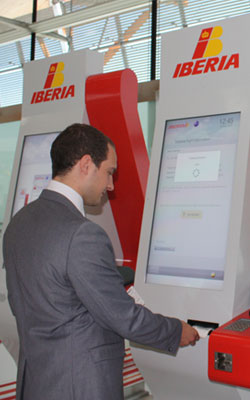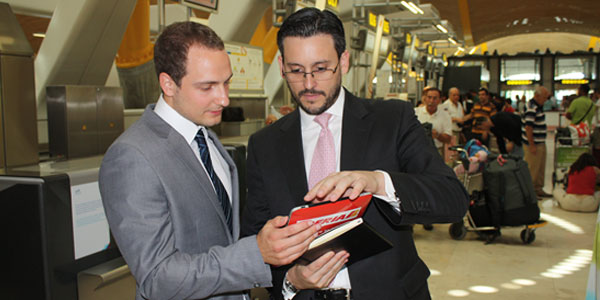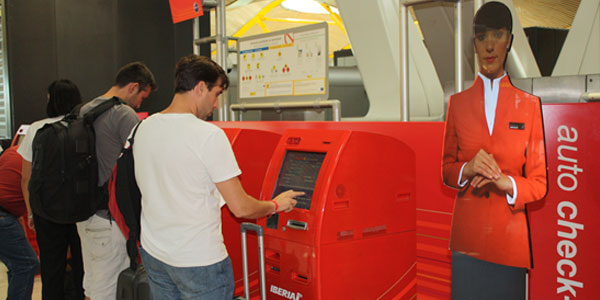
At every stage of the passenger’s journey through the airport, Iberia is taking steps to make significant improvements and provide a seamless and stress-free experience. A focus has been placed on self-service and mobility, so no matter where the passenger is in the terminal building, they are within easy reach of a self-service solution or a roving customer agent waiting to help them with any enquiry.
“It may sound contradictory, but the passenger wants to feel independent and assisted at the same,” explained Dimitris Bountolos Montabes, the airline’s Head of Coordination and Hub Development. “We serve many passengers with many different profiles and we have to meet the expectations of all of them.”
Providing an early example of the positive impact of Ágora, located just metres from the gates to provide easy access for both arriving and departing passengers, Quick Service Points are in place, where passengers can use the touchscreen kiosks to get information on airport facilities, get flight information and print a new boarding pass for connecting flights, retrieve directions to a point of interest within the terminal, and even print out hotel or meal vouchers if their connecting flight has been delayed or cancelled.
Another Quick Service Point can also be found in the baggage reclaim area, where passengers can again scan their boarding pass to find out the delivery status of their baggage, while soon they will be able to arrange for delayed baggage to be delivered to a specific address.
Remote check-in

Throughout the terminal, roving customer service agents are on hand to help passengers with any enquiries. The IBHelp initiative is particularly useful for passengers in the check-in hall, where the agents can use the iPad to check passengers in and remotely connect with the check-in counters and kiosks to print passengers’ boarding passes, removing the need for them to queue up at the conventional counters. The airline is also exploring the possibility of introducing mobile printers that can be carried by each of the roving agents and would allow for boarding passes to be printed on the spot.
IBHelp is essentially a development of the previous IBPad project and Iberia is also planning to add a payment functionality, which would allow passengers to pay for upgrades, excess baggage and other ancillary services directly through the iPad.
Montabes said: “Lot of other airlines have been in touch to find out how this has been deployed, the complexities involved, how it is working, and so on. The IBPad was a crucial technical challenge and it carried some risk as we were the first airline to use the iPad as a corporate tool in this way. Now, the risk has disappeared and from this milestone we have been able to develop IBHelp and there will be more to come.”
The use of the iPad as a key customer service tool has even attracted the attention of Apple. “We are exchanging ideas, identifying new trends and sharing thoughts about how we can evolve,” explained Alejandro Rivera Gil, Airport Development Project Manager at Iberia. “We are thinking not about tomorrow, but into the medium term.
“Iberia and Apple mutually identified a joint interest and we are working together to try to unlock the future trends of technology. What we are doing is transferring their processes to the corporate world.”
Real-time benefits

Just this week, two new phases of the Ágora project are being implemented. In addition to the activation of next-generation and more user-friendly self-service check-in kiosks, which are located alongside a virtual assistant and can issue boarding passes and bag tags in less than 20 seconds, a projector will also go live in the check-in area tomorrow (August 3rd), which will project a six-metre ‘floating’ image displaying the status of each of the check-in desks. If a desk is free, it will be displayed in green, if it is occupied it will be displayed in red, and if it is closed, it will be displayed in grey. FTE will bring you photos from the launch of the ‘floating’ image in next week’s edition.
“We’ve worked out that it takes the passengers six seconds on average to realise that a check-in desk is free, so by projecting this image and making it clear when a check-in desk is free and which one the passenger should go to, we are hoping to save six seconds for every passenger,” Montabes explained. “When you think about it, this will make a big difference because for the 100th passenger in that queue it will be a time saving of ten minutes.”
As all of the information is automatically updated across an integrated IT platform, the roving customer service agents can also approach the desks and assist with the processing of passengers using the iPad to help speed-up throughput if processing times are lagging. “Thanks to the mobility, we are always prepared,” Gil added.
The use of iPads to improve the passenger experience also extends to the inflight experience, where each member of the cabin crew has their own iPad called an ‘IBPurse’, which includes automatically updated, detailed information on each of the passengers, thereby allowing the airline to offer a more personalised experience. “There has previously been a breakage from the moment the door on the plane is closed,” explained Rafael Blanco Nadales, Inflight Senior Manager, Support and Control. “IBPurse provides a link so the airport and inflight experiences are no longer isolated.”
Adding value
With a roadmap in place through to 2015, there is clearly a lot more to come from Iberia’s Ágora project, but already, just seven months after its official launch, it’s clear that each of the initiatives are adding value to every step of the passenger journey. Through continued close collaboration with likes of Apple and Aena, the operator of Madrid-Barajas Airport, there is a very real chance that Iberia could well establish its T4 hub as the world’s most user-friendly airport terminal.






